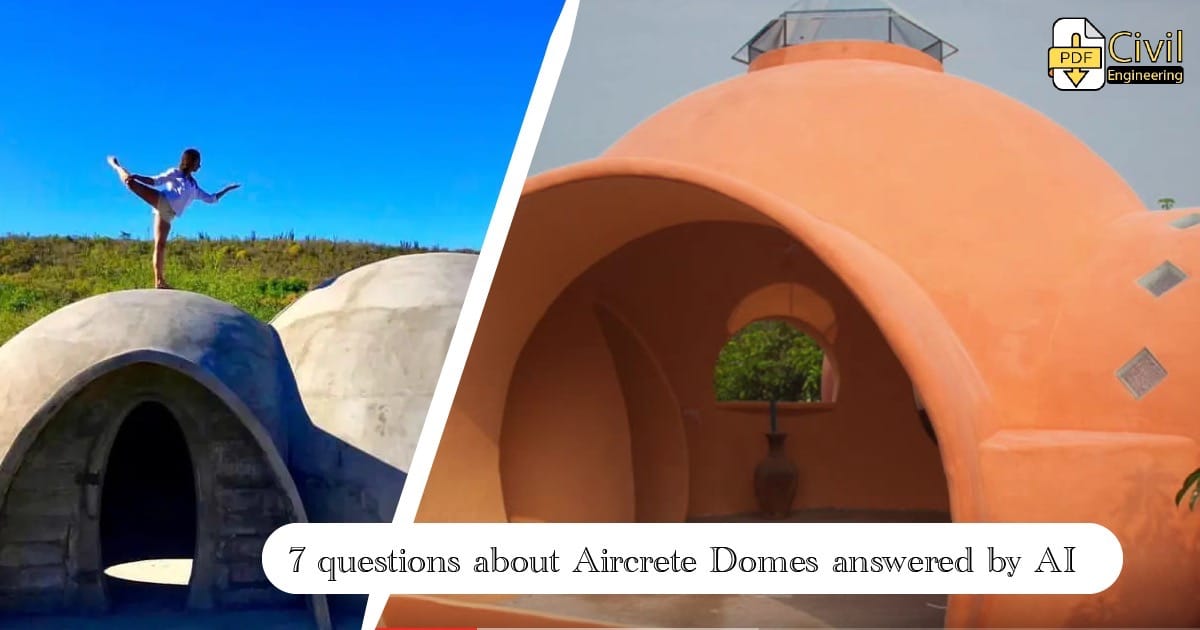There are many questions you could ask about aircrete domes, including this:
- What are the benefits of using aircrete for constructing domes?
- How is the construction process for an aircrete dome different from other types of domes?
- What are the design considerations for building an aircrete dome?
- How does the cost of building an aircrete dome compare to other types of domes?
- Are there any notable examples of aircrete domes that have been built?
- How do you finish the surface of an aircrete dome?
- What are the long-term durability and maintenance considerations for an aircrete dome?
Here are some answers to the questions we listed:
1- What are the benefits of using aircrete for constructing domes?
Aircrete is a type of lightweight concrete that is made by mixing cement with an expanding agent, such as foam or air-entraining agents. One of the main benefits of using aircrete for constructing domes is that it is much lighter in weight than traditional concrete, which makes it easier to handle and transport. This can reduce the cost and complexity of the construction process. Aircrete also has good insulating properties, which can help to reduce heating and cooling costs in the dome.
2-How is the construction process for an aircrete dome different from other types of domes?
The construction process for an aircrete dome is similar to the process for building other types of domes, such as concrete or steel domes. However, the use of aircrete may require some modifications to the construction process. For example, aircrete is typically poured into forms or molds, so the shape of the dome will need to be carefully designed and the forms constructed accordingly. Additionally, the use of aircrete may require specialized equipment, such as foam generators, to properly mix and apply the material.
3-What are the design considerations for building an aircrete dome?
There are several design considerations that need to be taken into account when building an aircrete dome. These include the size and shape of the dome, the load-bearing capacity of the dome, the intended use of the dome (e.g., residential, commercial, industrial), the local climate, and any relevant building codes and regulations.
It is important to carefully plan the design of the dome to ensure that it is safe, functional, and aesthetically pleasing.
4-How does the cost of building an aircrete dome compare to other types of domes?
The cost of building an aircrete dome can vary depending on a number of factors, such as the size and complexity of the dome, the materials used, and the location of the project. In general, aircrete is less expensive than traditional concrete, and it may be more cost-effective to use aircrete in some applications.
However, the use of aircrete may also require specialized equipment and expertise, which can increase the overall cost of the project.
It is important to carefully evaluate the costs and benefits of using aircrete versus other materials when planning a dome construction project.
5-Are there any notable examples of aircrete domes that have been built?
There have been a number of notable examples of aircrete domes that have been built around the world. Some examples include the Pantheon in Rome, the Airforce Academy Cadet Chapel in Colorado Springs, and the Geodesic Dome at the University of Illinois.
6-How do you finish the surface of an aircrete dome?
The surface of an aircrete dome can be finished in a variety of ways, depending on the intended use of the dome and the desired aesthetic. Some options for finishing the surface of an aircrete dome include applying a layer of stucco or plaster, painting the surface, or applying tiles or other cladding materials.
It is important to use high-quality finishing materials and techniques to ensure that the dome is durable and long-lasting.
7-What are the long-term durability and maintenance considerations for an aircrete dome?
Aircrete is generally a durable and low-maintenance material, but it is important to properly care for an aircrete dome to ensure its long-term durability.
This may include regularly inspecting the dome for cracks or other damage, and making any necessary repairs in a timely manner.
These are just a few examples, but you can ask any other questions you may have about aircrete domes as well.
See also:
